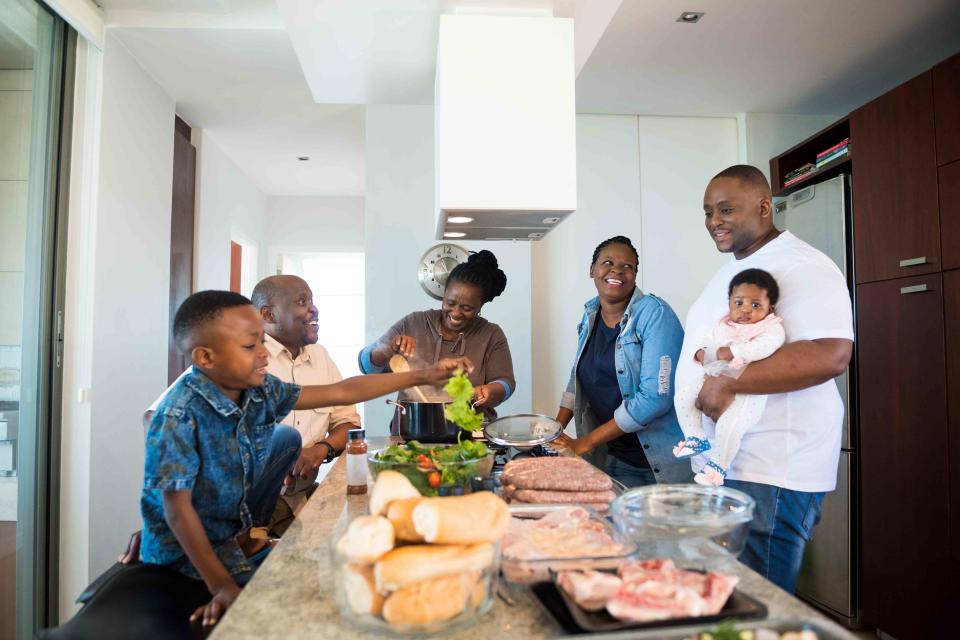How Family Support Eases Postpartum Depression, According to a Doctor
Having your loved ones present while you're experiencing postpartum depression can make a serious difference.

E+
In Nigeria, there’s a concept called Omugwo. It is a longstanding tradition wherein mothers visit their daughters or daughter-in-laws to support them after they’ve given birth. However, this idea isn't exclusive to people from Nigeria–it’s also prevalent amongst Black American families. While bringing new life into the world is a miraculous journey, it can also be a daunting one, particularly for Black mothers. The early stages of motherhood can be a whirlwind of emotions, responsibilities, and changes. The shift can sometimes lead to postpartum depression, a condition that affects 1 in every 10 women who give birth, including celebrities like Cardi B and Ayesha Curry.
Often mistaken for “baby blues,” postpartum depression is more complex than mood swings. It's a serious mental health condition that can affect a woman's ability to care for herself and her child. Symptoms of postpartum depression can include persistent sadness, loss of interest in activities, changes in appetite and sleep patterns, and overwhelming fatigue. It's a condition that needs attention, understanding, and support to overcome. Community can be of major assistance.
When Ghanaian-American Kimberly Jolasun built Villie, she wanted to create a space that focused on issues common to mothers and guide them through certain hurdles—including postpartum depression. “We also wanted to help friends and families understand new mothers so we would give them tips and tricks on how to support expectant parents or new ones,” Jolasun tells Kindred of her digital village for new parents.
Jolasun experienced postpartum depression and understands the importance of having family present during the early stages of motherhood. “When it comes to my recovery, my mother-in-law played a pivotal role. Her involvement and understanding were instrumental in helping me navigate those difficult moments,” she shares. “There were moments where I felt overwhelmed by guilt, [but] a visit from her would brighten even the darkest days. My experience highlights the importance of having a strong support system, and how cultural understanding can play a significant role in the recovery from postpartum depression.”
Dr. Andrea Braden, an OB-GYN, thinks that historically, people have not always been isolated with their newborns, with multiple cultures outside of the U.S. having set processes for support in place. “Parents who can come in and families who can come in and stay with you for a while can make so much difference and just lifting that load. Family knows you well oftentimes,” she says. She also says that the ways in which families are able to help new moms with postpartum depression depends on the strength of the relationship prior to the child’s birth. “Again, this is a caveat, if you have a healthy relationship with your family, it can be super helpful.”
For new Black mothers battling postpartum depression, this love is a lifeline, helping them navigate dark moments. New mothers may feel alone in their struggle. Families therefore, provide a vital connection to the wider family network, and reduce these senses of isolation. They can step in to offer respite when needed, allowing mothers to take a break and prioritize self-care.
If you don’t have family to support you, that’s okay. Having some sort of circle of support, whether they’re related to you or not, can make a difference. Dr. Braden thinks a great substitute is a postpartum doula or a baby nurse. “These are people who recreate that village. They become part of that family that is missing and come into the house and know what to do,” she says. She also suggests the normalization of taking medically prescribed antidepressants, if needed. “Most common medication would be Selective Serotonin Reuptake Inhibitors (SSRIs). There are new meds that have just come out which work on Gamma Aminobutyric Acids (GABA) receptors.”
Shamic healer and reiki master Denise Damijo had her first two children when she was a teenager. Having grown up in foster care and being raised kids without her parents’ support, she’s understood the importance of building a community; one where there doesn’t have to be blood relations. “They do not have to be your mother or mother-in-law. They could be someone you met along the way, and fills that same need and desire,” she says.
The transformative effects of family support extend beyond combating postpartum depression; they empower new Black mothers to embrace their roles with confidence, love, and resilience.
For more Parents news, make sure to sign up for our newsletter!
Read the original article on Parents.

